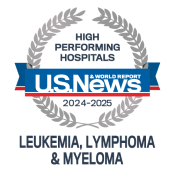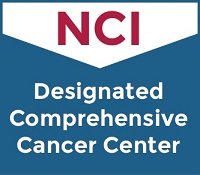Leukemia
Leukemia is a group of blood cancers that develop in the bone marrow and affect how blood cells function. It can progress slowly (chronic) or more aggressively (acute).
The University of Maryland Marlene and Stewart Greenebaum Comprehensive Cancer Center (UMGCCC) was the first cancer center in the Baltimore/Washington area to offer groundbreaking immunotherapy treatment for blood cancers.
At University of Maryland, we have years of experience treating and researching leukemia in adults and children. If you need information about treating childhood leukemia, our UM Children’s Hospital team can help.
Leukemia Care at UMGCCC
At UMGCCC you’ll get compassionate care from a national leader in cancer treatment:
- We are recognized for excellence in patient care and research by the National Cancer Institute.
- We are a leader in immunotherapy, which uses the body’s own immune system to fight cancer. We were among the first cancer centers in the United States to offer CAR-T cell therapy, a cutting-edge treatment for leukemia and lymphoma.
- We have a state-of-the-art stem cell transplant unit, with a team of internationally and nationally recognized leaders in the field.
- Our multidisciplinary approach to treatment means specialists from different fields, including oncologists, hematologists and nutritionists, consult to develop the best care and support plan for you.
- You have access to clinical trials that explore cutting-edge therapies aiming to improve outcomes and reduce treatment side effects.
If you need help with a leukemia diagnosis or getting treatment, call 410-328-7904 for an appointment.
Jump to: Diagnosis | Treatment
Types of Leukemia
There are four main types of leukemia:
- Acute myeloid leukemia (AML) – AML is a rare cancer that progresses quickly. The body produces too many immature blood cells called myeloid blasts that crowd out healthy blood cells and disrupt normal functions like blood clotting.
- Chronic myeloid leukemia (CML) – The body’s chromosomes don’t form properly, instead forming an abnormal “Philadelphia chromosome,” which causes bone marrow to produce too many diseased white blood cells. CML progresses slower than AML.
- Acute lymphocytic leukemia (ALL) – ALL causes too many immature white blood cells, or lymphocytes, to form in the bone marrow. They do not function as they should and can also spread to other parts of the body. ALL progresses quickly. It's the only one of these four leukemia types that’s most likely to occur in people under 20 years old.
- Chronic lymphocytic leukemia (CLL) – CLL causes bone marrow to produce more lymphocytes than it should, and they become cancerous. It progresses slowly; people can be symptom-free for a few years.
Diagnosing Leukemia
There are a few tests your doctor may use to diagnose leukemia:
- Blood tests are used to count the amount and type of blood cells.
- A bone marrow aspiration takes a sample of cells or tissue from bone marrow and examines it for abnormalities.
- Molecular tests may be used to detect abnormal genes.
- X-rays, a CT scan, ultrasound or MRI could be used to check other organs for signs of leukemia-related damage.
Leukemia Treatment at UMGCCC
Your treatment plan will depend on the type of leukemia you have and how far it has progressed, as well as your overall health.
Common treatments for leukemia we provide include:
- Chemotherapy – strong medications are administered through an IV or pill to kill cancer cells throughout the body
- Radiation therapy – high-energy beams are used to kill cancer cells and shrink tumors, usually used if leukemia has spread beyond the bone marrow or blood
- Targeted therapy – medication used to target and destroy cancer cells without hurting the surrounding healthy cells and tissue
- Immunotherapy – the body’s own immune system is strengthened to fight cancer cells
- Stem cell transplant – donated stem cells replaced damaged ones so bone marrow can produce healthy blood cells
Our Location
UMGCCC is located in Baltimore. Get directions and parking info before visiting.
For more information, call 410-328-7904.



